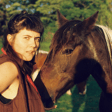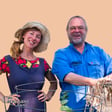
Brenna Quinlan’s 10 Foundations of an F YEAH! Existence
You already know today's guest. You’ve admired her art, chortled at her pithy permaculture puns and perhaps even listened to her rhyme along with Formidable Vegetable, those eco-funk, full of beans, electro-radish rockers.
It's the perennially brilliant Brenna Quinlan! Illustrator and educator who brandishes her watercolour brushes at the world’s gnarliest problems, and paints beautiful alternatives.
In this convo:
🪺 All about Brenna & Charlie’s three year build.
🪺 The stories in the walls of their strawbale home.
🪺 Intentional community living.
🪺 Teasing out the finer strands of what brings you joy in groups, work, life.
🪺 What’s next for Brenna?
🪺 Brenna's 10 things! Not gonna tell you what they are.
🧙♀️ LINKY POOS
Grow Do It ~ Permaculture + Sustainability Education
[COMING SOON] Costa’s Garden ~ Costa Georgiadis & Brenna Quinlan
Goodies Farm ~ Straw farmer



















